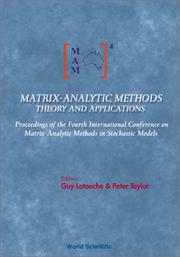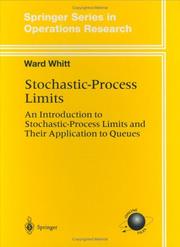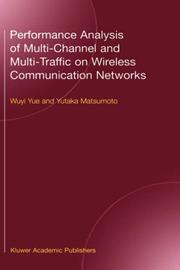| Listing 1 - 3 of 3 |
Sort by
|

ISBN: 1281929530 9786611929534 9812777164 9789812777164 9812380515 9789812380517 9781281929532 6611929533 Year: 2002 Publisher: [River Edge,] NJ : World Scientific,
Abstract | Keywords | Export | Availability | Bookmark
 Loading...
Loading...Choose an application
- Reference Manager
- EndNote
- RefWorks (Direct export to RefWorks)
Matrix-analytic methods are fundamental to the analysis of a family of Markov processes rich in structure and of wide applicability. They are extensively used in the modelling and performance analysis of computer systems, telecommunication networks, network protocols and many other stochastic systems of current commercial and engineering interest.This volume deals with: (1) various aspects of the theory of block-structured Markov chains; (2) analysis of complex queueing models; and (3) parameter estimation and specific applications to such areas as cellular mobile systems, FS-ALOHA, the Intern
Markov processes --- Queuing theory --- Matrices --- Stochastic processes --- Algebra, Matrix --- Cracovians (Mathematics) --- Matrix algebra --- Matrixes (Algebra) --- Algebra, Abstract --- Algebra, Universal --- Markov, Processus de --- Files d'attente, Théorie des --- Processus stochastiques --- Congresses. --- Congresses --- Congrès

ISBN: 1280187840 9786610187843 0387217487 0387953582 Year: 2002 Publisher: New York, New York State : Springer,
Abstract | Keywords | Export | Availability | Bookmark
 Loading...
Loading...Choose an application
- Reference Manager
- EndNote
- RefWorks (Direct export to RefWorks)
Stochastic Process Limits are useful and interesting because they generate simple approximations for complicated stochastic processes and also help explain the statistical regularity associated with a macroscopic view of uncertainty. This book emphasizes the continuous-mapping approach to obtain new stochastic-process limits from previously established stochastic-process limits. The continuous-mapping approach is applied to obtain heavy-traffic-stochastic-process limits for queueing models, including the case in which there are unmatched jumps in the limit process. These heavy-traffic limits generate simple approximations for complicated queueing processes and they reveal the impact of variability upon queueing performance. The book will be of interest to researchers and graduate students working in the areas of probability, stochastic processes, and operations research. In addition this book won the 2003 Lanchester Prize for the best contribution to Operation Research and Management in English, see: http://www.informs.org/Prizes/LanchesterPrize.html.
Queuing theory --- Stochastic processes --- Mathematics --- Physical Sciences & Mathematics --- Mathematical Statistics --- Queuing theory. --- Stochastic processes. --- Files d'attente, Théorie des --- Processus stochastiques --- EPUB-LIV-FT SPRINGER-B --- Mathematics. --- Operations research. --- Decision making. --- Probabilities. --- Statistics. --- Probability Theory and Stochastic Processes. --- Operation Research/Decision Theory. --- Statistical Theory and Methods. --- Distribution (Probability theory. --- Mathematical statistics. --- Operations Research/Decision Theory. --- Statistics . --- Operational analysis --- Operational research --- Industrial engineering --- Management science --- Research --- System theory --- Statistical analysis --- Statistical data --- Statistical methods --- Statistical science --- Econometrics --- Deciding --- Decision (Psychology) --- Decision analysis --- Decision processes --- Making decisions --- Management --- Management decisions --- Choice (Psychology) --- Problem solving --- Probability --- Statistical inference --- Combinations --- Chance --- Least squares --- Mathematical statistics --- Risk --- Decision making --- Erlang traffic formula --- Queueing theory --- Theory of queues --- Waiting-line theory --- Production scheduling --- Random processes --- Probabilities

ISBN: 1280207949 9786610207947 0306473119 0792376773 Year: 2002 Publisher: New York : Kluwer Academic Publishers,
Abstract | Keywords | Export | Availability | Bookmark
 Loading...
Loading...Choose an application
- Reference Manager
- EndNote
- RefWorks (Direct export to RefWorks)
With the rapidly increasing penetration of laptop computers and mobile phones, which are primarily used by mobile users to access Internet s- vices like e-mail and World Wide Web (WWW) access, support of Internet services in a mobile environment is an emerging requirement. Wireless n- works have been used for communication among fully distributed users in a multimedia environment that has the needs to provide real-time bursty traffic (such as voice or video) and data traffic with excellent reliability and service quality. To satisfy the huge wireless multimedia service demand and improve the system performance, efficient channel access methods and analytical methods must be provided. In this way very accurate models, that faithfully reproduce the stochastic behavior of multimedia wireless communication and computer networks, can be constructed. Most of these system models are discrete-time queueing systems. Queueing networks and Markov chains are commonly used for the p- formance and reliability evaluation of computer, communication, and m- ufacturing systems. Although there are quite a few books on the individual topics of queueing networks and Markov chains, we have found none that covers the topics of discrete-time and continuous-time multichannel mul- traffic queueing networks. On the other hand, the design and development of multichannel mul- hop network systems and interconnected network systems or integrated n- works of multimedia traffic require not only such average performance m- sures as the throughput or packet delay but also higher moments of traffic departures and transmission delay.
Wireless communication systems. --- Wireless communication systems --- Design and construction. --- Computer Communication Networks. --- Distribution (Probability theory. --- Mathematics. --- Multimedia systems. --- Computer engineering. --- Probability Theory and Stochastic Processes. --- Applications of Mathematics. --- Multimedia Information Systems. --- Electrical Engineering. --- Computer communication systems. --- Probabilities. --- Applied mathematics. --- Engineering mathematics. --- Multimedia information systems. --- Electrical engineering. --- Queuing theory. --- Electric engineering --- Engineering --- Computer-based multimedia information systems --- Multimedia computing --- Multimedia information systems --- Multimedia knowledge systems --- Information storage and retrieval systems --- Engineering analysis --- Mathematical analysis --- Probability --- Statistical inference --- Combinations --- Mathematics --- Chance --- Least squares --- Mathematical statistics --- Risk --- Communication systems, Computer --- Computer communication systems --- Data networks, Computer --- ECNs (Electronic communication networks) --- Electronic communication networks --- Networks, Computer --- Teleprocessing networks --- Data transmission systems --- Digital communications --- Electronic systems --- Information networks --- Telecommunication --- Cyberinfrastructure --- Electronic data processing --- Network computers --- Distributed processing --- Communication systems, Wireless --- Wireless data communication systems --- Wireless information networks --- Wireless telecommunication systems --- Telecommunication systems --- Erlang traffic formula --- Queueing theory --- Theory of queues --- Waiting-line theory --- Production scheduling --- Stochastic processes
| Listing 1 - 3 of 3 |
Sort by
|

 Search
Search Feedback
Feedback About UniCat
About UniCat  Help
Help News
News